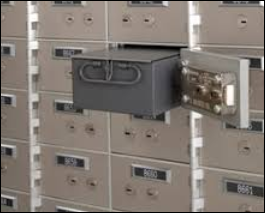 Why should I rent a safe deposit box? It is a convenient place to store important items that would be difficult or impossible to replace. The safe deposit box also offers privacy (only you know what is inside) and security. Although many people like to keep valuables close by in a closet, safe or file cabinet at home or in the office, these places probably are not as resistant to fire, water or theft. Also, some insurance companies charge lower insurance premiums on valuables kept in a bank’s safe deposit box instead of at home.
Why should I rent a safe deposit box? It is a convenient place to store important items that would be difficult or impossible to replace. The safe deposit box also offers privacy (only you know what is inside) and security. Although many people like to keep valuables close by in a closet, safe or file cabinet at home or in the office, these places probably are not as resistant to fire, water or theft. Also, some insurance companies charge lower insurance premiums on valuables kept in a bank’s safe deposit box instead of at home.
What items should go into a safe deposit box? Any personal items that would cause you to say, “If I lose this, I am in deep trouble.” Important papers to consider putting into your safe deposit box: originals of your insurance policies; family records such as birth, marriage and death certificates; original deeds, titles, mortgages, leases and other contracts; stocks, bonds and certificates of deposit (CDs). Other valuables worthy of a spot in your safe deposit box include special jewels, medals, rare stamps and other collectibles, negatives for irreplaceable photos, and videos or pictures of your home’s contents for insurance purposes (in case of theft or damage).
OK, what should NOT go in a safe deposit box? Anything you might need in an emergency, in case your bank is closed for the night, the weekend or a holiday. Possible examples: originals of a “power of attorney” (your written authorization for another person to transact business on your behalf), passports (in case of an emergency trip), medical-care directives if you become ill and incapacitated, and funeral or burial instructions you make. Consider giving the originals to your attorney, and making copies to go in your safe deposit box or to give a close friend or relative.
If I have a will, should it go in my safe deposit box? Whether your will should be at the bank or elsewhere, such as with your attorney, depends on what your State law says about who has access to your safe deposit box when you die. Ideally, the person you name to oversee your financial matters after you die (your “executor” or “personal representative”) should have early access to your original will (copies are not valid). Some States make it relatively easy for co-renters, family members or the executor to remove the will and certain other documents (such as life insurance policies and burial instructions) from a deceased person’s safe deposit box. In those States, it may be a good idea to leave your will in the safe deposit box. But other States may require a court order or another official action to remove the will, which can take time and money. That is why you should check with your lawyer to find out what is required under State law and your bank’s own policies in the event of your death.
Contents of your Safe Deposit Box are not insured by Twin River Bank or any government insurance program.
| Size of Box | Annual Rent |
| 3″ x 5″ x 21″ | $20.00 |
| 3″ x 10″ x 21″ | $35.00 |
| 5″ x 10″ x 21″ | $50.00 |
| 10″ x 10″ x 21″ | $85.00 |
| Lost safe deposit box key | $20.00 |
| Safe deposit box drill fee | $200.00 |
| Key Deposit (refundable upon return of both keys when box is closed.) | $20.00 |
